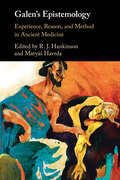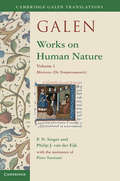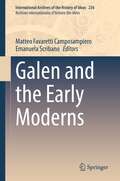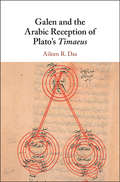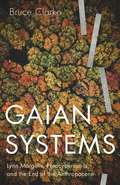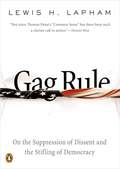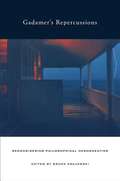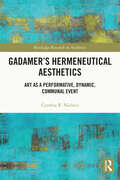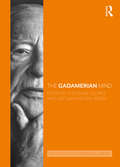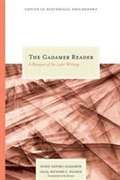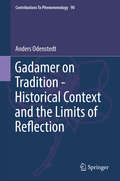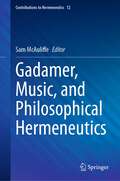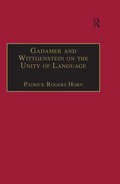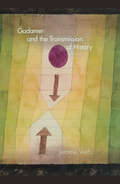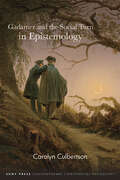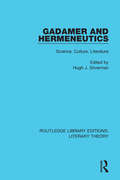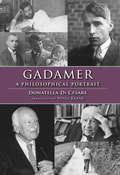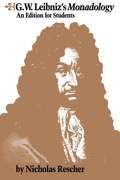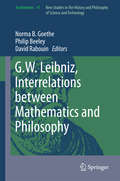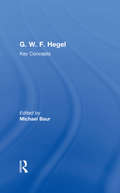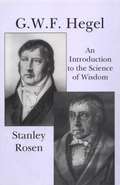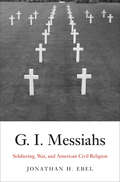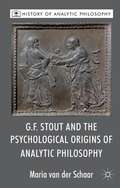- Table View
- List View
Galen's Epistemology: Experience, Reason, and Method in Ancient Medicine
by R. J. Hankinson Matyáš HavrdaDetermining what has gone wrong in a malfunctioning body and proposing an effective treatment requires expertise. Since antiquity, philosophers and doctors have wondered what sort of knowledge this expertise involves, and whether and how it can warrant its conclusions. Few people were as qualified to deal with these questions as Galen of Pergamum (129–ca. 216). A practising doctor with a keen interest in logic and natural science, he devoted much of his enormous literary output to the task of putting medicine on firm methodological grounds. At the same time he reflected on philosophical issues entailed by this project, such as the nature of experience, its relation to reason, the criteria of truth, and the methods of justification. This volume explores Galen's contributions to (mainly scientific) epistemology, as they arise in the specific inquiries and polemics of his works, as well as their legacy in the Islamic world.
Galen: Volume 1, Mixtures (Cambridge Galen Translations)
by Dr P. N. Singer Professor Philip J. van der Eijk Professor Piero TassinariMixtures is of central importance for Galen's views on the human body. It presents his influential typology of the human organism according to nine mixtures (or 'temperaments') of hot, cold, dry and wet. It also develops Galen's ideal of the 'well-tempered' person, whose perfect balance ensures excellent performance both physically and psychologically. Mixtures teaches the aspiring doctor how to assess the patient's mixture by training one's sense of touch and by a sophisticated use of diagnostic indicators. It presents a therapeutic regime based on the interaction between foods, drinks, drugs and the body's mixture. Mixtures is a work of natural philosophy as well as medicine. It acknowledges Aristotle's profound influence whilst engaging with Hippocratic ideas on health and nutrition, and with Stoic, Pneumatist and Peripatetic physics. It appears here in a new translation, with generous annotation, introduction and glossaries elucidating the argument and setting the work in its intellectual context.
Galen and the World of Knowledge
by Christopher Gill Tim Whitmarsh John WilkinsGalen is the most important medical writer in Graeco-Roman antiquity, and also extremely valuable for understanding Graeco-Roman thought and society in the second century AD. This volume of new essays locates him firmly in the intellectual life of his period, and thus aims to make better sense of the medical and philosophical 'world of knowledge' that he tries to create. How did Galen present himself as a reader and an author in comparison with other intellectuals of his day? Above all, how did he fashion himself as a medical practitioner, and how does that self-fashioning relate to the performance culture of second-century Rome? Did he see medicine as taking over some of the traditional roles of philosophy? These and other questions are freshly addressed by leading international experts on Galen and the intellectual life of the period, in a stimulating collection that combines learning with accessibility.
Galen and the Early Moderns (International Archives of the History of Ideas Archives internationales d'histoire des idées #236)
by Matteo Favaretti Camposampiero Emanuela ScribanoThis book explores the presence of Galen of Pergamon (129 – c. 216 AD) in early modern philosophy, science, and medicine. After a short revival due to the humanistic rediscovery of his works, the influence of the great ancient physician on Western thought seemed to decline rapidly as new discoveries made his anatomy, physiology, and therapeutics more and more obsolete. In fact, even though Galenism was gradually dismissed as a system, several of his ideas spread through the modern world and left their mark on natural philosophy, rational theology, teleology, physiology, biology, botany, and the philosophy of medicine. Without Galen, none of these modern disciplines would have been the same. Linking Renaissance with the Enlightenment, the eleven chapters of this book offer a unique and detailed survey of both scientific and philosophical Galenisms from the sixteenth to the late eighteenth century. Figures discussed include Julius Caesar Scaliger, Giambattista Da Monte, Hyeronimus Fabricius ab Aquapendente, Andrea Cesalpino, Thomas Browne, Kenelm Digby, Henry More, Ralph Cudworth, Robert Boyle, John Locke, Guillaume Lamy, Jean-Baptiste Verduc, Gottfried Wilhelm Leibniz, Christian Wolff, Julien Offray de La Mettrie, Denis Diderot, and Kurt Sprengel.
Galen and the Arabic Reception of Plato's Timaeus
by Aileen R. DasThis first full-length study of the Arabic reception of Plato's Timaeus considers the role of Galen of Pergamum (129–c. 216 CE) in shaping medieval perceptions of the text as transgressing disciplinary norms. It argues that Galen appealed to the entangled cosmological scheme of the dialogue, where different relations connect the body, soul, and cosmos, to expand the boundaries of medicine in his pursuit for epistemic authority – the right to define and explain natural reality. Aileen Das situates Galen's work on disciplinary boundaries in the context of medicine's ancient rivalry with philosophy, whose professionals were long seen as superior knowers of the cosmos vis-à-vis doctors. Her case studies show how Galen and four of the most important Christian, Muslim, and Jewish thinkers in the Arabic Middle Ages creatively interpreted key doctrines from the Timaeus to reimagine medicine and philosophy as well as their own intellectual identities.
Gaian Systems: Lynn Margulis, Neocybernetics, and the End of the Anthropocene (Posthumanities #60)
by Bruce ClarkeA groundbreaking look at Gaia theory&’s intersections with neocybernetic systems theory Often seen as an outlier in science, Gaia has run a long and varied course since its formulation in the 1970s by atmospheric chemist James Lovelock and microbiologist Lynn Margulis. Gaian Systems is a pioneering exploration of the dynamic and complex evolution of Gaia&’s many variants, with special attention to Margulis&’s foundational role in these developments.Bruce Clarke assesses the different dialects of systems theory brought to bear on Gaia discourse. Focusing in particular on Margulis&’s work—including multiple pieces of her unpublished Gaia correspondence—he shows how her research and that of Lovelock was concurrent and conceptually parallel with the new discourse of self-referential systems that emerged within neocybernetic systems theory. The recent Gaia writings of Donna Haraway, Isabelle Stengers, and Bruno Latour contest its cybernetic status. Clarke engages Latour on the issue of Gaia&’s systems description and extends his own systems-theoretical synthesis under what he terms &“metabiotic Gaia.&” This study illuminates current issues in neighboring theoretical conversations—from biopolitics and the immunitary paradigm to NASA astrobiology and the Anthropocene. Along the way, he points to science fiction as a vehicle of Gaian thought. Delving into many issues not previously treated in accounts of Gaia, Gaian Systems describes the history of a theory that has the potential to help us survive an environmental crisis of our own making.
Gag Rule: On the Suppression of Dissent and the Stifling of Democracy
by Lewis LaphamLapham issues a call to action in defense of one of our most important liberties--the right to raise our voices against the powers that be and have those voices heard.
Gadamer's Repercussions: Reconsidering Philosophical Hermeneutics
by Bruce KrajewskiThis volume brings together many prominent scholars to assess, re-evaluate, and question Hans-Georg Gadamer's works, as well as his place in intellectual history. The book includes a recent essay by Gadamer on "the task of hermeneutics."
Gadamer’s Hermeneutical Aesthetics: Art as a Performative, Dynamic, Communal Event (Routledge Research in Aesthetics)
by Cynthia R. NielsenThis book offers a sustained scholarly analysis of Gadamer’s reflections on art and our experience of art. It examines fundamental themes in Gadamer’s hermeneutical aesthetics such as play, festival, symbol, contemporaneity, enactment, art’s performative ontology, and hermeneutical identity. The first two chapters focus on Gadamer’s critical appropriation and movement beyond Kantian and Hegelian aesthetics (and includes a coda on Heidegger’s influence). The final three chapters argue for the continued relevance of Gadamer’s hermeneutical aesthetics by bringing his claims into conversation with contemporary art and music, as well as the ethical and sociopolitical dimensions of the Artworld and art-praxis. The ethical and sociopolitical aspects of art- and music-making are given particular attention in chapters devoted to 20th century African American artist Romare Bearden, Banksy’s street art, and a range of jazz expressions, from traditional jazz to the complex practice of free jazz. Gadamer’s Hermeneutical Aesthetics will appeal to researchers and advanced students working on Gadamer, philosophical hermeneutics, continental philosophy, aesthetics, and the philosophy of contemporary art and music.
The Gadamerian Mind (Routledge Philosophical Minds)
by Theodore GeorgeHans-Georg Gadamer (1900–2002) is one of the most important philosophers of the post-1945 era. His name has become all but synonymous with the philosophical study of hermeneutics, the field concerned with theories of understanding and interpretation and laid out in his landmark book Truth and Method. Influential not only within continental philosophy, Gadamer’s thought has also made significant contributions to related fields such as religion, literary theory, and education. The Gadamerian Mind is a major survey of the fundamental aspects of Gadamer’s thought, with contributions from leading scholars of Gadamer and hermeneutics from around the world. 38 chapters are divided into six clear parts: Overviews Key concepts Historical influences Contemporary encounters Beyond philosophy Legacies and questions. Although Gadamer’s work addresses a remarkable range of topics, careful consideration is given throughout the volume to consistent concerns that orient his thought. Important in this respect is his relation to philosophers in the Western tradition, from Plato to Heidegger. An indispensable resource for anyone studying and researching Gadamer, hermeneutics, and the history of twentieth-century philosophy, The Gadamerian Mind will also be of interest to those in related disciplines such as religion, literature, political theory, and education.
The Gadamer Reader: A Bouquet Of The Later Writings
by Richard E. Palmer Hans-Georg GadamerThe German volume Gadamer Lesebuch [A Gadamer Reader] (1997), selected and edited by Jean Grondin in consultation with Hans-Georg Gadamer himself, contains a set of essays that present a cross section of writings by one of the twentieth century's greatest philosophers. The volume begins with an autobiographical sketch and culminates in a conversation with Jean Grondin that looks back over a lifetime of productive philosophical work. The essays not already available in English have here been translated by Richard E. Palmer, a respected translator of Gadamer's writings. The sixteen essays contained in the Lesebuch are augmented here by three other essays: Gadamer's last essay on Derrida, "Hermeneutics Tracking the Trace" (1994) and two essays on practical philosophy. The Gadamer Reader: A Bouquet of the Later Writings richly conveys the scope and depth of Gadamer's thought, covering the range of his work in hermeneutics, aesthetics, practical philosophy, and essays on Plato, Hegel, and Heidegger. In addition, Palmer offers introductory remarks before each essay that explain its importance in the context of Gadamer's writings and define its key terms. Throughout, in both his translation and commentary, his aim is to make this critically important philosopher as clear and accessible as possible to an English-speaking audience.
Gadamer on Tradition - Historical Context and the Limits of Reflection
by Anders OdenstedtThis book discusses Gadamer's theory of context-dependence. Analytical and partly critical, the book also shows exegetical accuracy in the rendering of Gadamer's position. It explores the following questions that Gadamer's theory of context-dependence tries to answer: in what way is thought influenced by and thus dependent on its historical context? To what extent and in what way is the individual able to become reflectively aware of and emancipate himself from this dependence? The book takes Gadamer's wide interests into account, e. g. issues relating to the history of historiography and the nature of art and aesthetic experience. The problem of the context-dependence of thought is prominent in contemporary philosophy, including the fields of structuralism, post structuralism, deconstruction, certain forms of feminist philosophy and the philosophy of science. In this sense, the book discusses an issue with wide repercussions.
Gadamer, Music, and Philosophical Hermeneutics (Contributions to Hermeneutics #12)
by Sam McAuliffeThis volume explores Hans-Georg Gadamer's philosophical hermeneutics within a musical context. It features contributions from philosophers, musicians, educators, and musicologists from a variety of backgrounds, and sheds light on both the hermeneutic nature of music and the musicality of hermeneutics. Contributors to this volume hermeneutically think with music to uncover its fundamentally hermeneutic character, and by thinking with Gadamer in a musical context, explore ways in which hermeneutics may be understood to possess an inherent musicality. Gadamer's thought is taken up in a variety of musical contexts including improvisation, musical performance, classical music, jazz, and music criticism.This first volume to explore Gadamer's hermeneutics in a musical context breaks new ground by challenging musical concepts and by pushing Gadamer's thought in new directions. It appeals to philosophers engaged with Gadamer's thought (and philosophical hermeneutics more broadly), as well as philosophers of music, musicologists, and musicians interested in critically engaging with the practice of performing and listening to music.
Gadamer and Wittgenstein on the Unity of Language: Reality and Discourse without Metaphysics (Ashgate Wittgensteinian Studies)
by Patrick Rogers HornIn this innovative comparison of Gadamer and Wittgenstein, the author explores their common concern with the relation of language to reality. Patrick Horn's starting point is the widely accepted view that both philosophers rejected a certain metaphysical account of that relation in which reality determines the nature of language. Horn proceeds to argue that Gadamer never completely escaped metaphysical assumptions in his search for the unity of language. In this respect, argues Horn, Gadamer's work is nearer to the earlier rather than to the later Wittgenstein. The final chapter of the book highlights the work of Wittgenstein’s pupil Rush Rhees, who shows that Wittgenstein's own later emphasis on language games, while doing justice to the variety of language, does less than justice to the dialogical relation between speakers of a language, wherein the unity of language resides. Contrasting Rhees's account of the unity of language with those given by Gadamer and the early Wittgenstein brings out the importance of understanding reality in terms of the life that people share rather than in terms of what philosophers say about reality.
Gadamer and the Transmission of History (Studies In Continental Thought Ser.)
by Jerome VeithObserving that humans often deal with the past in problematic ways, Jerome Veith looks to philosopher Hans-Georg Gadamer and his hermeneutics to clarify these conceptions of history and to present ways to come to terms with them. Veith fully engages Truth and Method as well as Gadamer's entire work and relationships with other German philosophers, especially Kant, Hegel, and Heidegger in this endeavor. Veith considers questions about language, ethics, cosmopolitanism, patriotism, self-identity, and the status of the humanities in the academy in this very readable application of Gadamer's philosophical practice.
Gadamer and the Social Turn in Epistemology (SUNY series in Contemporary Continental Philosophy)
by Carolyn CulbertsonWhile some take Gadamer's Truth and Method to be a departure from epistemological questions and concerns, author Carolyn Culbertson reads Gadamer's work as offering a valuable reflection on the nature of understanding—one that is deeply resonant with the recent social turn in epistemology. Like social epistemologists, Gadamer worries about the epistemic irresponsibility that we encourage when we treat an attitude of objectivity, wherein the inquirer lacks any awareness of their social and historical situation, as an epistemic ideal. Like social epistemologists too, Gadamer argues that understanding that one is socially and historically situated does not mean believing that one is fated to simply repeat traditional ideas without critique or modification—a concern frequently raised in response to critiques of Enlightenment epistemology. By developing such parallels, Gadamer and the Social Turn in Epistemology offers seasoned readers of Gadamer a new context in which to appreciate his discussion of understanding in Truth and Method and readers unfamiliar with Gadamer a productive point of access into his major work.
Gadamer and the Legacy of German Idealism
by Kristin GjesdalThe philosophy of Hans-Georg Gadamer interests a wide audience that spans the traditional distinction between European (continental) and Anglo-American (analytic) philosophy. Yet one of the most important and complex aspects of his work - his engagement with German Idealism - has received comparatively little attention. In this book, Kristin Gjesdal uses a close analysis and critical investigation of Gadamer's Truth and Method (1960) to show that his engagement with Kant, Hegel, and Schleiermacher is integral to his conception of hermeneutics. She argues that a failure to engage with this aspect of Gadamer's philosophy leads to a misunderstanding of the most pressing problem of post-Heideggerian hermeneutics: the tension between the commitment to the self-criticism of reason, on the one hand, and the turn towards the meaning-constituting authority of tradition, on the other. Her study provides an illuminating assessment of both the merits and the limitations of Gadamer's thought.
Gadamer and Hermeneutics: Science, Culture, Literature (Routledge Library Editions: Literary Theory #12)
by Hugh J. SilvermanThis title, first published in 1991, opens with an account by Gadamer of his own life and work and their relation to the achievements of hermeneutics. Building upon the key theme of dialogue, Gadamer and Hermeneutics provides a series of essays, either linked Gadamer to other major contemporary philosophers or focusing on a given Gadamerian theme. This book will be of interest to students of literary theory.
Gadamer: A Philosophical Portrait
by Donatella Di CesareHans-Georg Gadamer (1900-2002), one of the towering figures of contemporary Continental philosophy, is best known for Truth and Method, where he elaborated the concept of "philosophical hermeneutics," a programmatic way to get to what we do when we engage in interpretation. Donatella Di Cesare highlights the central place of Greek philosophy, particularly Plato, in Gadamer's work, brings out differences between his thought and that of Heidegger, and connects him with discussions and debates in pragmatism. This is a sensitive and thoroughly readable philosophical portrait of one of the 20th century's most powerful thinkers.
G.W. Leibniz's Monadology
by Nicholas RescherFirst published in 1992. Routledge is an imprint of Taylor & Francis, an informa company.
G.W. Leibniz, Interrelations between Mathematics and Philosophy
by Norma B. Goethe Philip Beeley David RabouinUp to now there have been scarcely any publications on Leibniz dedicated to investigating the interrelations between philosophy and mathematics in his thought. In part this is due to the previously restricted textual basis of editions such as those produced by Gerhardt. Through recent volumes of the scientific letters and mathematical papers series of the Academy Edition scholars have obtained a much richer textual basis on which to conduct their studies - material which allows readers to see interconnections between his philosophical and mathematical ideas which have not previously been manifested. The present book draws extensively from this recently published material. The contributors are among the best in their fields. Their commissioned papers cover thematically salient aspects of the various ways in which philosophy and mathematics informed each other in Leibniz's thought.
G. W. F. Hegel: Key Concepts (Key Concepts)
by Michael BaurThe thought of G. W. F. Hegel (1770 -1831) has had a deep and lasting influence on a wide range of philosophical, political, religious, aesthetic, cultural and scientific movements. But, despite the far-reaching importance of Hegel's thought, there is often a great deal of confusion about what he actually said or believed.G. W. F. Hegel: Key Concepts provides an accessible introduction to both Hegel's thought and Hegel-inspired philosophy in general, demonstrating how his concepts were understood, adopted and critically transformed by later thinkers. The first section of the book covers the principal philosophical themes in Hegel's system: epistemology, metaphysics, philosophy of mind, ethical theory, political philosophy, philosophy of nature, philosophy of art, philosophy of religion, philosophy of history and theory of the history of philosophy. The second section covers the main post-Hegelian movements in philosophy: Marxism, existentialism, pragmatism, analytic philosophy, hermeneutics and French poststructuralism.The breadth and depth of G. W. F. Hegel: Key Concepts makes it an invaluable introduction for philosophical beginners and a useful reference source for more advanced scholars and researchers.
G. W. F. Hegel: An Introduction To The Science Of Wisdom
by Stanley RosenG.W.F. Hegel: An Introduction to the Science of Wisdom
G.I. Messiahs
by Jonathan H. EbelJonathan Ebel has long been interested in how religion helps individuals and communities render meaningful the traumatic experiences of violence and war. In this new work, he examines cases from the Great War to the present day and argues that our notions of what it means to be an American soldier are not just strongly religious, but strongly Christian. Drawing on a vast array of sources, he further reveals the effects of soldier veneration on the men and women so often cast as heroes. Imagined as the embodiments of American ideals, described as redeemers of the nation, adored as the ones willing to suffer and die that we, the nation, may live-soldiers have often lived in subtle but significant tension with civil religious expectations of them. With chapters on prominent soldiers past and present, Ebel recovers and re-narrates the stories of the common American men and women that live and die at both the center and edges of public consciousness. "
G.F. Stout and the Psychological Origins of Analytic Philosophy
by Maria van der SchaarAn investigatation of the influence of psychology and early phenomenology on the origins of analytic philosophy. This book is also of value for those interested in judgement, proposition, psychologism, logical realism, the problem of error, Gestalt theories, and tropes.
